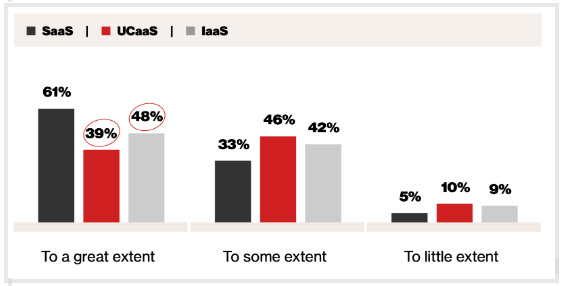Welcome to Number of the Month, where we dig deeper into the research and data that's shaping the communications technology industry. This month, we look at a report from technology expense and asset management firm Tangoe, which found that only 39% of those IT decision-makers (ITDM) they surveyed said their UCaaS investments fully delivered on their anticipated benefits.
The number of the month: 39%
That's the percentage of IT decision-makers who said their UCaaS investments fully delivered on their anticipated benefits, such as costs savings and ease of management. The number comes from a survey conducted by Tangoe and tech media partner Foundry. In January 2023, they surveyed 200 IT decision-makers (ITDMs) at large enterprises (the average number of employees was 6,855).
Why?
The report details multiple reasons why infrastructure as a service (IaaS), software as a service (SaaS) and UCaaS deployments don’t fully deliver on their promises of ease of use, scalability and agility, improved communications and collaboration, ease of management and, of course, cost savings. We spoke with Chris Ortbals, chief product officer at Tangoe, to dive deeper into the UCaaS challenges – particularly since the average company surveyed uses 11 UCaaS platforms.
“Shadow IT” was the number one challenge undermining the cost effectiveness of UCaaS deployments. Not only can shadow IT (software/devices used without explicit approval from IT) compromise the network, risk company data, etc., but it might generate duplicate costs or excessive costs borne by the company.
“Say you do an audit and find 300 Slack users, but there’s no company contract,” Ortbals said. “That gives the organization the opportunity to negotiate a better rate via an enterprise agreement. You can save costs right there. But you can’t do that if you don’t know what’s running on your network.”
As a step toward managing UCaaS and SaaS – and improving the odds of achieving those elusive benefits – one recommendation Ortbal offered involved creating a “linkage between HR and IT so that you build an automated workflow. When an employee offboards from a company, their licenses are automatically deprovisioned and then they become available for a new or existing employee to use. That’s usually a manual process now but automating it can help control costs.”
Another challenge in getting the most bang for the enterprise UcaaS buck: departmental autonomy in tech purchases. In large organizations, it is possible for one department to “slap down the [corporate] purchasing card and sign up for UCaaS,” Ortbals said. “That software isn’t vetted by IT, it’s not necessarily compliant, potentially opens a security hole – that’s challenging from an IT level because they don’t even necessarily know the software is running on the network.”
Extent to which Cloud Deployments Delivered on Promised Benefits
Source: Tangoe and Foundry survey, January 2023
There's also a question of diluting budgetary impact. Multiple company sanctioned UCaaS platforms are common because employees to use multiple UCaaS in order to communicate with clients, customers, etc., even though their own company may have standardized on a single platform (e.g., Teams, Zoom, Webex, etc.). “There are so many different platforms and if the company is global,” Ortbals said, “that just makes it more complex – every geography is different or has different preferences.”
The UCaaS players have made it easy for their products to be downloaded, installed and used – unless IT has blocked end users’ ability to install applications without authorization. Moreover, some UCaaS have browser-based options so there’s no need to install anything.
Remote work is, of course, a heavy driver both of UCaaS use and multiple platform adoption.
“Tangoe is fully remote,” Ortbals said. “Two years ago, we weren’t – and 59% of our survey respondents indicated they were fully remote now, too.”
To Learn More, Read These
To learn more about the challenges associated with deployed UCaaS, IaaS and SaaS, check out:










